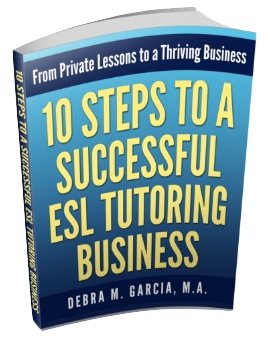Verb Tense List for ESL Teachers
Twelve Tenses to Teach
English Language Learners
The verb tense list below includes all twelve basic grammar tenses for English verbs. Most basic tenses have more than one name; it depends on the grammar book you use and on the teacher teaching the tenses. I've included all the names you might find in English grammar books.
Effectively teaching all the English verb tenses includes teaching conjugation, forms, and the functions of each of the tenses. See my ESL verb tenses page for strategies and teaching tips for ESL/EFL lessons.
Verb Tense List
- Simple Present or Present Simple
- Present Progressive, Present Continuous, Simple Present Progressive or Simple Present Continuous
- Simple Past or Past Simple
- Past Progressive, Past Continuous, Simple Past Progressive or Simple Past Continuous
- Present Perfect or Simple Present Perfect
- Present Perfect Progressive or Present Perfect Continuous
- Past Perfect or Simple Past Perfect
- Past Perfect Progressive or Past Perfect Continuous
- Simple Future or Future Simple
- Future Progressive, Future Continuous, Simple Future Progressive or Simple Future Continuous
- Future Perfect or Simple Future Perfect
- Future Perfect Progressive
- e.g., I play, you play, she/he/it plays, we play, they play
- e.g., I am playing, you are playing, she/he/it is playing, we are playing, they are playing
- e.g., I played, you played, he/she/it played, we played, they played
- e.g., I was playing, you were playing, she/he/it was playing, we were playing, they were playing
- e.g., I have played, you have played, he/she/it has played, we have played, they have played
- e.g., I have been playing, you have been playing, he/she/it has been playing, we have been playing, they have been playing
- e.g., I had played, you had played, he/she/it had played, we had played, they had played
- e.g., I had been playing, you had been playing, he/she/it had been playing, we had been playing, they had been playing
- e.g., I will play, you will play, he/she/it will play, they
will play, we will play or I am going to play, you are going to play,
he/she/it is going to play, we are going to play, they are going to play
- e.g., I will be playing, you will be playing, he/she/it will be playing, they will be playing, we will be playing
- e.g., I will have played, you will have played, he/she/it will have played, they will have played, we will have played
- e.g., I will have been playing, you will have been playing,
he/she/it will have been playing, they will have been playing, we will
have been playing
Verb Tense List Teaching Order
The above verb tense list is more or less in the order of how some teachers or tutors might teach ESL verb tenses to students studying English as a second language or English as a foreign language.
Some grammar books lay out the basic grammar tenses by past, present and future. That list of tenses would look something like this:
| Past | Present | Future |
| Simple Past | Simple Present | Simple Future |
| Past Progressive | Present Progressive | Future Progressive |
| Past Perfect | Present Perfect | Future Perfect |
| Past Perfect Progressive | Present Perfect Progressive | Future Perfect Progressive |
Textbook Recommendation for Teaching Verbs
My favorite textbook for ESL grammar and for teaching English grammar basic tenses to high intermediate and advanced learners is Azar's, Understanding and Using English Grammar. Not only does she present a detailed list of verb tenses, but she also diagrams time lines and has detailed examples and exercises. You can use this book to refresh yourself on the details of many grammar concepts and it's a great ESL textbook for English language learners; plus it has grammar exercises you can use in class.
From Verb Tense List to Teaching ESL to Adults Home


New! Comments
Have your say about what you just read! Leave me a comment in the box below.